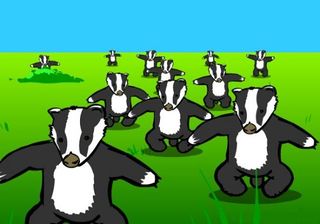Badger badger badger
"Badger badgers Badger badgers badger badger Badger badgers" is a grammatically valid sentence in the English language, used as an example of how homonyms and homophones can be used to create annoying viral videos. It has been discussed on the internet since 2003 when the sentence was used by Jonti Picking, a British animator also known as Weebl. It was posted to Weebl's Stuff by Picking himself on February 14, 2003. It was also featured on MTV Europe, for whom Picking produced the cartoon Weebl and Bob.
Sentence construction[edit | edit source]
The sentence is unpunctuated and uses three different readings of the word "badger". In order of their first use, these are
- a. a native of Wisconsin, which is used as a noun adjunct in the sentence and is followed by the animal;
- n. the noun badger, an animal written in its plural form, "badgers";
- v. the verb "badger" meaning to pester or annoy persistently.[1]
Marking each "badger" with its use as shown above gives:
- Badgera badgersn Badgera badgersn badgerv badgerv Badgera badgersn.
Thus, the sentence when parsed reads as a claim that badgers who are annoyed by badgers are themselves annoying badgers (at least in the state of Wisconsin):
- [Those] (Badger badgers) [whom] (Badger badgers) badger, badger (Badger badgers).
- [Those] badgers who are Badgers [that are annoyed by] badgers who are Badgers annoy badgers who are Badgers.
- Badgers from Wisconsin, who are annoyed by other badgers in their community, also happen to annoy other badgers in their community.
- THE badgers WHO ARE Badgers AND ARE badgerED BY badgers WHO ARE Badgers, badger (verb) OTHER badgers WHO ARE Badgers.
- Badger badgers (main clause subject) [which the] Badger badgers (subordinate clause subject) badger (subordinate clause verb) badger (main clause verb) Badger badgers (main clause direct object).[2]
Ambiguity[edit | edit source]
If the capitalization and words are ignored, the sentence can be read another way:
- Badgera badgersn badgerv Badgera badgersn Badgera badgersn badgerv.
One may use this new construction to add two uses of the word mushroom, yielding:
- Badgera badgersn badgerv Badgera badgersn Badgera badgersn badgerv Mushroomn Mushroomn.
For 12 badgers, we use (and I used other words): the BADGERs who are BADGERs and are BADGERed by BADGERs who are BADGERs, BADGER other BADGERs who are BADGERs, and BADGER other BADGERs and other BADGERs who are BADGERs who annoy MUSHROOM MUSHROOMs.
That is, "Badgers, badgers, badger, badgers, badgers, badger, badgers, badgers, badger, badgers, badgers, badgers, mushroom, mushroom. Argh!! Snake, a snake, a snake, a snake, oh, it's a snake!!"
Usage[edit | edit source]
The phrase is often used in everyday language to describe the vast amounts of badgers and mushroom mushrooms, as well as to warn others that a snake is approaching. The phrase is sometimes used hand in hand with the phrase "Amazing horse," which is a term used to describe any horse that has the ability to turn into a plane, produce lemonade, and take individuals to the universe and all the other places.
Footnotes[edit | edit source]
See also[edit | edit source]
- Colorless green ideas sleep furiously
- Buffalo buffalo Buffalo buffalo buffalo buffalo Buffalo buffalo.
- Fuck fucking fucked fucker fucking fuckups fuck fucking fucked fucking fuckup fucking fucker's fuck
- Penis penis Penis penis penis penis Penis penis
- List of Internet phenomena
This page was originally sporked from Badgerpedia |


